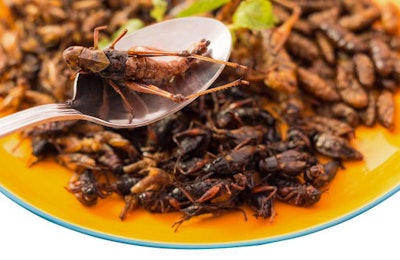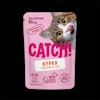
Insects as an ingredient in pet foods are getting a lot of attention these days, due to their high levels of protein balanced by relatively low levels of resources to grow and harvest them. Yet barriers such as regulatory, production and supply issues have to date prevented the interest in insects from rising beyond the research level, except for a few dog foods and pet treats on the market.
There’s also the “yuck” factor. While about 2 billion people globally eat insects as a regular part of their diet, according to FoodIngredientsFirst.com, that number typically doesn’t include squeamish Western consumers (such as yours truly, though I did once try a granola bar made with cricket flour). With humanization of pets now such a strong force, would that squeamishness apply to insects in pet food?
FoodIngredientsFirst.com published the findings of a study that investigated consumers’ “emotional reactions” to eating insects as part of their own diet, as well as eating beef from cows fed insects. If the results have any implications for attitudes toward insects in pet food, companies hoping to break through in this area might have a long, hard road ahead.
Freeze-dried, fried or processed? Still gross
Conducted by Muriel Verain of Wageningen University and Research, the study “involved a diverse collection of respondents” (the article doesn’t say how many or from where) and looked at their willingness to eat beans, seaweed and insects. For the insect portion of the research, respondents were asked about their intentions to eat insects in general, as a freeze-dried or fried food, or processed into other food products. They were also asked about their desire to eat hamburgers, both from cows fed traditional feed and those fed insects.
No matter how the insects were prepared, whether they were processed or even fed to cows, the overall reaction was negative, Verain said. “The emotions were almost the same for the different products. It was striking that people were no more willing to eat processed insects than they were whole ones."
“People thought hamburgers from cows that had eaten insects would be harder to prepare and would be less tasty compared with normal hamburgers,” she continued. Respondents also indicated that they believe insects are less safe than beef, even though insects were also seen as healthy, sustainable and natural, and contributing toward a healthier weight.
Do attitudes carry over into pet food?
What does this research mean for insects as a viable protein ingredient for pet food? I admit, this is pure speculation, but I think it carries some weight. Novelty aside, nearly every pet owner today, especially in developed markets and increasingly in developing ones, believes and says they should feed their pet the same way they feed their human family members.
Consider how many pet owners buy into marketing hype and label claims over “human grade” pet food ingredients. Or the multitudes who believe ingredients like meat by-products, such as organ meats, are bad and unhealthy for pets, despite research showing they are high in protein, bioavailability and palatability. That’s partly because many Western consumers shun organ meats for themselves. (Count me in that category, too.)
Verain does believe such attitudes related to human food can change, which again, could affect pet food. While only 15 percent of the respondents in her study had ever eaten insects even once, another 35 percent said they were open to trying bugs. “That means nearly half of people are willing to try insects. Social standards are significant when it comes to people’s intentions, and eating insects clearly has a cultural aspect,” she said, citing smoking as an example of a behavior toward which attitudes and cultural morés have evolved.
Personally, I could envision eating insects processed into other foods, and I certainly wouldn’t have a problem feeding my cats a cat food with insect protein, if that ever becomes an option on the market. After all, finding half-eaten flies in my house is not all that unusual.


















